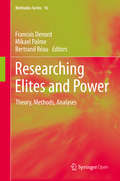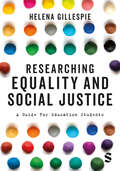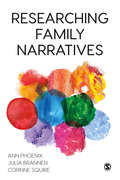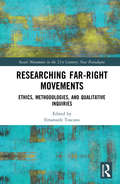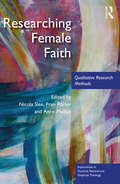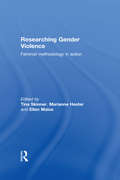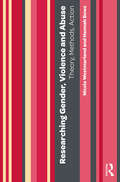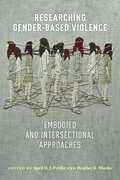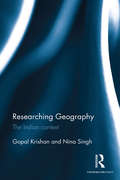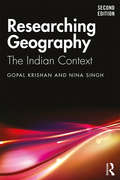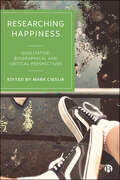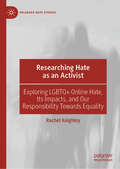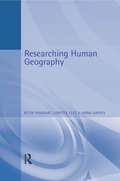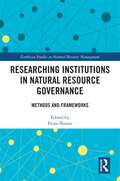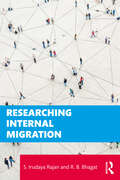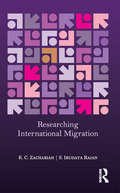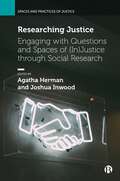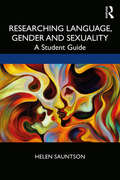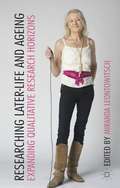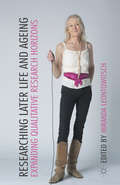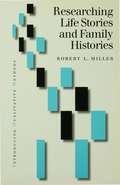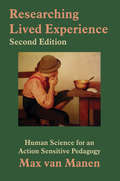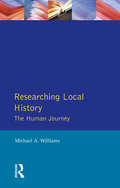- Table View
- List View
Researching Elites and Power: Theory, Methods, Analyses (Methodos Series #16)
by Francois Denord Mikael Palme Bertrand RéauThis open access book describes how elite studies theoretically and methodologically construct their object, i.e. how particular conceptualizations of elites are turned into research practice using different methods for collecting, dealing with and analyzing empirical data. The first of four sections focuses on what Mills named the power elite and includes Bourdieu’s field of power. The second section addresses studies of the domain of economic power, whereas the third section centers on research on elite education. The fourth and last section highlights research on symbolic power, either within social fields or as a dimension of social structure at large, areas where recognition is essential. All sections comprise empirical case studies of elites and power, whereby each of which makes explicit the various methodological choices made in the research process. Through focusing on methodological approaches for the study of elites and power and on how such approaches relate to each other as well as to the theoretical perspectives that underpin them, this book will be a valuable source for social scientists.
Researching Equality and Social Justice: A Guide For Education Students
by Helena GillespieIn order to successfully complete a research project on social issues, as part of your education or social science degree, you will need a confident understanding of often challenging and nuanced topics. This book provides an overview of how to approach researching issues relating to key social justice issues including: race, sex and gender, disability and mental health. It will help you to understand important concepts, how to avoid hidden biases and how to use appropriate terminology in each area. It combines this thematic approach with accessible guidance on the research process, from initial design and formulating your research question, through to data collection and analysis. Helena Gillespie is Professor of Learning and Teaching in Higher Education at the University of East Anglia.
Researching Equality and Social Justice: A Guide For Education Students
by Helena GillespieIn order to successfully complete a research project on social issues, as part of your education or social science degree, you will need a confident understanding of often challenging and nuanced topics. This book provides an overview of how to approach researching issues relating to key social justice issues including: race, sex and gender, disability and mental health. It will help you to understand important concepts, how to avoid hidden biases and how to use appropriate terminology in each area. It combines this thematic approach with accessible guidance on the research process, from initial design and formulating your research question, through to data collection and analysis. Helena Gillespie is Professor of Learning and Teaching in Higher Education at the University of East Anglia.
Researching Family Narratives
by Corinne Squire Julia Brannen Ann PhoenixThis edited book guides students and researchers through the processes of researching everyday stories about families. Showcasing the wide range methods and data sources currently used in narrative research, it features: Examples of real research into historical and contemporary family practices from around the world. Coverage of both traditional and cutting-edge topics, like multi-method approaches, online research, and paradata. Practical advice from leading figures in the field on how to incorporate these methods and data sources into family narrative research. With accessible language and features that help readers reflect on and internalize key concepts, this book helps readers navigate researching family lives with confidence and ease.
Researching Family Narratives
by Corinne Squire Julia Brannen Ann PhoenixThis edited book guides students and researchers through the processes of researching everyday stories about families. Showcasing the wide range methods and data sources currently used in narrative research, it features: Examples of real research into historical and contemporary family practices from around the world. Coverage of both traditional and cutting-edge topics, like multi-method approaches, online research, and paradata. Practical advice from leading figures in the field on how to incorporate these methods and data sources into family narrative research. With accessible language and features that help readers reflect on and internalize key concepts, this book helps readers navigate researching family lives with confidence and ease.
Researching Far-Right Movements: Ethics, Methodologies, and Qualitative Inquiries (Social Movements in the 21st Century: New Paradigms)
by Emanuele ToscanoAs extreme and far right movements become increasingly widespread in many countries, the sociology of social movements is called to confront them. This book addresses the specific challenges entailed by the empirical study of such movements, presenting case studies from Japan, Thailand, England, France, Italy, the USA, and Turkey. Based on empirical fieldwork, the chapters explore the ethics and politics of researching far right movements, considering the researcher's reflexivity and the methodological issues raised by being emotionally linked to a research object that affirms and strives for values that differ markedly from those of the researcher. As such, it will appeal to scholars of sociology and politics with interests in social movements and research methods.
Researching Female Faith: Qualitative Research Methods (Explorations in Practical, Pastoral and Empirical Theology)
by Anne Phillips Nicola Slee Fran PorterReligious and spiritual engagement has undergone multiple significant changes in recent decades. Researching Female Faith is a collection of essays based on recent and original field research conducted by the contributors, and informed by a variety of theoretical perspectives, into the faith lives of women and girls – broadly from within a Christian context. Essays describe and recount original qualitative research that identifies, illuminates and enhances our understanding of key aspects of women’s and girls’ faith lives. Offered as a contribution to feminist practical and pastoral theology, the essays arise out of and feed back into a range of mainly UK pastoral and practical contexts. While the essays in this volume will contribute to an enhanced appreciation and analysis of female faith, the core focus is on feminist qualitative research methods and methodology. Thus, they demystify and illuminate the process of research, including features of research which are frequently under-examined. The book is a first in bringing together a specific focus on feminist qualitative research methodology with the study of female faith lives. It will therefore be of great interest to students, academics and practitioners with interests in faith and gender in theology, religious studies and sociology.
Researching Gender Violence: Feminist Methodology In Action
by Ellen Malos Marianne Hester Tina SkinnerIn this edited collection leading authors in the field draw on their experience to address key methodological questions and challenges that have arisen from the recent proliferation of research projects and government funded initiatives on violence against women. Topics include: evaluation research and feminist methodology; using quantitative and qualitative approaches; ethics, safety and access in sensitive research; interviewing practitioners, perpetrators, policy makers, and survivors (including children, women and young people); utilising discourse analysis to interpret data; undertaking cross national and comparative research; practical guidelines for practitioners/academics wishing to consult with women survivors; gearing research to facilitate positive change in policy and practice; and using the media for dissemination. increased focus on gender related violence politically and academicallythis book addresses head on the complex methodological issues involvedleading experts in the field as contributors
Researching Gender, Violence and Abuse: Theory, Methods, Action
by Nicole Westmarland Hannah BowsFeminist research on gender, violence and abuse has been an area of academic study since the late 1970s, and has increased exponentially over this time on a global scale. Although situated in a predominantly qualitative tradition, research in the field has developed to include quantitative and mixed methodologies. This book offers a compendium of research methods on gender and violence, from the traditional to the innovative, and showcases best practice in feminist research and international case studies. Researching Gender, Violence and Abuse covers: The origins of feminist research, Ethical considerations relating to research on gender, violence and abuse, Working in partnership with organisations such as the police or the voluntary sector, A comprehensive range of research methods including interviews and focus groups, surveys, arts-based research and ethnography, The challenges and opportunities of working with existing data, The influence of activism on research and the translation of research into policy and practice. This book is perfect reading for students taking courses on violence against women, domestic violence, gender and crime, as well as advanced students embarking on new research.
Researching Gender-Based Violence: Embodied and Intersectional Approaches
by Heather R. Hlavka April D. J. PetilloAn interdisciplinary collection of critical, feminist reflections on interpersonal gender violenceDespite the growing interest in the subject of gender violence, surprisingly little has been written in recent years about the methodology behind this emerging field of research. This interdisciplinary collection seeks to fill this gap by empowering scholars to conduct gender violence research in ways that deconstruct rather than reinforce existing power structures and hierarchies. The book argues for new approaches to research and activism on gender-based violence grounded in the intersectional realities of individuals and communities. Each chapter discusses the role of reflective methodologies to recognize institutional and intersectional inequalities, challenging the reader to contemplate ethical considerations of an embodied feminist methodology when researching gender-based violence. By centering these issues for applied scholars, practitioners, and academic activists, the book offers insights about where sociocultural notions of criminality and innocence might align across geographies of gender-based violence.The volume encourages further thinking about embodied methodological creativity in and for the future of interpersonal gender-based violence research. A powerful tool for conducting productive scholarship, Researching Gender-Based Violence provides recommendations for interrogating, practicing, and collaborating across fields, disciplines, and lived realities.
Researching Geography: The Indian context
by Nina Singh Gopal KrishanThis book is a one-stop comprehensive guide to geographical inquiry. A step-by-step account of the hows and the whys of research methodology. Introduces students to the complexities of geographical perspective and thought, essentials of fieldwork, formulation of research topics, data collection, analysis and interpretation as well as presentation and dissemination. Includes inputs and specific examples to help practitioners negotiate between theory and practice. Uses a lucid, engaging and literary style. It will be an essential companion for researchers and students of geography, social sciences, and South Asian studies.
Researching Geography: The Indian context
by Nina Singh Gopal KrishanThis book is a one-stop comprehensive guide to geographical inquiry. A step-by-step account of the hows and the whys of research methodology; Introduces students to the complexities of geographical perspective and thought, essentials of fieldwork, formulation of research topics, data collection, analysis and interpretation as well as presentation and dissemination; Includes inputs and specific examples to help practitioners negotiate between theory and practice; The second edition reflects updates in current trends in sampling, data interpretation, and data analysis. Lucid, engaging and accessible, this book will be an essential companion for researchers and students of geography, social sciences, and South Asian studies.
Researching Happiness: Qualitative, Biographical and Critical Perspectives
by Mark CieslikIn the past, happiness studies has been dominated by the work of philosophers, economists and psychologists, but more recently there has been a growing interest from social scientist into the natures of happiness and wellbeing. This original collection draws on the latest empirical research to explore the practical challenges facing happiness researchers today, such as how to conduct happiness research in different cultural contexts, how to theorise wellbeing or how to operationalise definitions of happiness in qualitative and biographical research. By uniquely combining the critical approach of sociology with techniques from other disciplines, the contributors illuminate new approaches to the study of happiness and well-being.
Researching Hate as an Activist: Exploring LGBTQ+ Online Hate, Its Impacts, and Our Responsibility Towards Equality (Palgrave Hate Studies)
by Rachel KeighleyThis book examines research as activism through a case study of online hate targeting LGBTQ+ young people. It focuses on key issues concerning defining online hate, LGBTQ+ young people’s experiences of and the harms of online hate. The book introduces the reader to research as activism, exploring how academic research has an obligation to be accountable to the communities we serve. It presents a reconsideration of researching hate that prioritizes the knowledge and expertise of community members above the academic researcher. Drawing on empirical data, the book is a call to action which argues for a moral and personal duty to address social injustices using our privilege as academics. Research as activism requires you to go beyond the four walls of your university to actively respond to socio-political injustices. Thus, the book discusses how researchers can use their academic tools for change. It speaks to academics, students, and practitioners interested in LGBTQ+ identities, hate studies, online safety, and research as activism.
Researching Human Geography
by Anna Davies Loretta Lees Keith HoggartResearching Human Geography is an essential new text for any geography student about to embark on a research project. An understanding of how different theories of knowledge have influenced research methodologies is crucial in planning and designing effective research; this book makes this link clear and explores how various philosophical positions, from positivism to post-structuralism, have become associated with particular methodologies.The book gives an overview of a wide range of methods and data collection, both quantitative and qualitative, and explores their strengths and weaknesses for different kinds of research. 'Researching Human Geography' also looks at the various techniques available for the analysis of data, which is presented as an integral and ongoing part of the research process. Clearly written, with extensive use of examples from previous research to show 'methodology in action', this new text is an invaluable addition to both the theory and method of research in human geography.
Researching Institutions in Natural Resource Governance: Methods and Frameworks (Earthscan Studies in Natural Resource Management)
by Fiona NunanThis book presents an overview of different data collection methods and approaches that have been used to identify and analyse institutions associated with natural resource governance.Institutions as rules of the game are fundamental to the management, governance and use of renewable natural resources, such as fisheries, forests and water. Yet researching institutions, particularly informal institutions, can be challenging as they can be difficult to identify, investigate and understand. This volume tackles this challenge head on. The innovative collection brings together contributions from different disciplines and traditions reporting and reflecting on a range of qualitative and quantitative research methods and experiences. The book begins by reviewing definitions and typologies of institutions and introduces different approaches to researching institutions in natural resource governance, namely the Bloomington School, associated with Elinor Ostrom, and Critical Institutionalism. Following this, each chapter provides an overview and example of application of research approaches and methods, including mixed methods, institutional grammar, fuzzy cognitive mapping, network analysis, assemblage and ethnography. The concluding chapter identifies key insights into institutions and lessons on researching institutions. From these, the chapter provides a set of observations on researching institutions in natural resource governance, with the aim of providing guidance for new and experienced researchers.The volume provides an essential introduction for students and researchers into the range of methods and approaches, and their practical application, that can be used to research institutions associated with natural resource governance.
Researching Internal Migration
by S. Irudaya Rajan R. B. BhagatResearching Internal Migration is a comprehensive guide for researchers and professionals to study internal migration in developing and underdeveloped economies. This book: • Explains key theoretical concepts related to migration • Guides students and researchers on how to design surveys and the utility of census data • Unravels the complexities of large data sets and their interpretation • Includes techniques for indirect measurement • Presents methodology for estimating remittances at the sub-national and national levels • Acquaints the impact of migration during emergency situations or pandemics like COVID-19 • Offers perspectives and tools for evaluating the policy impact of migration Accessibly written, this book will be an essential theoretical and empirical guide for researchers in development studies, public policy, population studies, human geography and migration and diaspora studies.
Researching International Migration: Lessons from the Kerala Experience
by S. Irudaya Rajan K. C. ZachariahInternational migration and workers’ remittances have, of late, become a significant economic and social phenomena affecting the fortunes of millions of families in the developing countries of Asia, Africa and Latin America. Yet, the measurements and methods of analysis of their impact on the individuals, families, economy, and society have not received the attention they deserve. A first-of-its-kind study of international migration, based on large-scale surveys across a span of 15 years of fieldwork, this book: includes methods of conducting field surveys, estimating migration, and analysing migration trends, remittances, selectivity, and differentials; assesses other demographic, socio-economic phenomenon, such as education, employment and women’s status; provides a methodology to evaluate remittances and their influence on the economy; and examines social costs of migration on those left behind — parents, wives and children — a neglected area in the field of migration. This handbook will be invaluable to scholars and students of migration studies, demography, development studies and sociology as well as policy-makers, administrators, academics, and non-governmental organisations in the field.
Researching Justice: Engaging with Questions and Spaces of (In)Justice through Social Research (Spaces and Practices of Justice)
by Richard White Don Mitchell Simon Springer Andrew McGregor Elizabeth Mavroudi Corine Wood-Donnelly Jen Dickinson Jennifer Balint Deepti Chatti Barbora Adlerova Ana Moragues Faus Ophélie Véron Natasha Uwimanzi Kate DericksonUnderstanding justice, for many, begins with questions of injustice. This volume pushes us to consider the extent to which our scholarly and everyday practices are, or can become, socially just. In this edited collection, international contributors reflect on what the practice of ‘justice’ means to them, and discuss how it animates and shapes their research across diverse fields from international relations to food systems, political economy, migration studies and criminology. Giving insights into real life research practices for scholars at all levels, this book aids our understanding of how to employ and live justice through our work and daily lives.
Researching Language, Gender and Sexuality: A Student Guide
by Helen SauntsonResearching Language, Gender and Sexuality leads students through the process of undertaking research in order to explore how gender and sexuality are represented and constructed through language. Drawing on international research, Sauntson incorporates a fluid understanding of genders and sexualities and includes research on a diverse range of identities. This accessible guidebook offers an outline of the practical steps and ethical guidelines involved when gathering linguistic data for the purpose of investigating gender and sexuality. Each chapter contains up-to-date information and empirical case studies that relate to a range of topics within the field of language, gender and sexuality, as well as suggestions for how students could practically research the areas covered. Student-friendly, this is essential reading for undergraduate and postgraduate students of English language, linguistics and gender studies.
Researching Later Life and Ageing: Expanding Qualitative Research Horizons
by Miranda LeontowitschThis collection on researching later life and ageing critically reflects upon the qualitative methods used in gaining knowledge of under-researched groups of older people and sets out future research agendas.
Researching Later Life and Ageing: Expanding Qualitative Research Horizons
by Miranda LeontowitschThis collection on researching later life and ageing critically reflects upon the qualitative methods used in gaining knowledge of under-researched groups of older people and sets out future research agendas.
Researching Life Stories and Family Histories (Introducing Qualitative Methods series)
by Robert Lee Miller`A comprehensive, balanced and judicious treatment of biographical methods in social research, made all the more useful to students by its careful delineation of the practicalities involved′ - Raymond M Lee, Royal Holloway, University of London Specifically designed for those carrying out biographical, life history or family history research, this concise guide covers the methods and issues involved. The author demonstrates that biographical research is a distinctive way of conceptualizing social activity. The three main approaches to biographical and family history research are covered: - Realist - focused around grounded-theory techniques of interviewing; - Neo-positivist - more structured interview techniques; - Narrative - with emphasis on the active construction of life stories through the interplay between interviewer and interviewee. An invaluable introduction to the field, which contains much that will be of interest to the experienced practitioner, the book will be ideal for researchers in sociology, psychology, political science, social policy or anthropology.
Researching Lived Experience: Human Science for an Action Sensitive Pedagogy
by Max van ManenBestselling author Max van Manen’s Researching Lived Experience introduces a human science approach to research methodology in education and related fields. The book takes as its starting point the "everyday lived experience" of human beings in educational situations. Rather than rely on abstract generalizations and theories in the traditional sense, the author offers an alternative that taps the unique nature of each human situation. First published in 1990, this book is a classic of social science methodology and phenomenological research, selling tens of thousands of copies over the past quarter century. Left Coast is making available the second edition of this work, never before released outside Canada. Researching Lived Experience offers detailed methodological explications and practical examples of inquiry. It shows how to orient oneself to human experience in education and how to construct a textual question which evokes a fundamental sense of wonder, and it provides a broad and systematic set of approaches for gaining experiential material which forms the basis for textual reflections. The author: -Discusses the part played by language in educational research-Pays special attention to the methodological function of anecdotal narrative in research-Offers approaches to structuring the research text in relation to the particular kinds of questions being studied
Researching Local History: The Human Journey (Approaches to Local History)
by M. WilliamsThis practical but inspiring book considers what local history is, why researching it is valuable and rewarding, and how we should go about it. Issues addressed include: getting oral and documentary evidence; keeping records; the nature of data, information and knowledge; and their use to create the different products of local history research. Michael Williams is both a professional scientist and a local historian of long standing, and he uses both sides of his experience in a text that is at once rigorous about the historical process, and also a fascinating - and often moving - account of his adventures into the past of his own family and community. He demonstrates local history methodology through his research into ancestry, migration, work, war and religion in the towns and villages of England and Wales. It is richly illustrated throughout.
